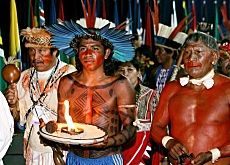Little movement on biodiversity benefits

Switzerland says some progress has been made at an international conference in Brazil on biodiversity, even if few measures were agreed.
The ten-day meeting sought to win a commitment from governments party to the United Nations Convention on Biological Diversity (CBD) to significantly reduce biodiversity loss by 2010.
The meeting in the Brazilian city of Curitiba discussed such comprehensive issues as promoting sustainable use of biodiversity, protecting traditional knowledge, ensuring the equitable sharing of benefits from the use of “genetic resources” and finding funding for developing countries to implement the convention.
The director of the Swiss Environment Office, Bruno Oberle, said governments were able to agree on the details concerning the Cartagena Protocol on Biosafety.
“It was decided that genetically modified foodstuffs and animal feed have to be labelled as such when they are transported from one state to another,” Oberle told swissinfo.
Oberle admitted that little progress was achieved on one of the key issues: access to genetic resources and benefit sharing (ABS).
The convention says that countries have to be informed and compensated by third parties such as multinational concerns who remove, for example, rare plants in order to use their genetic resources.
How?
“This is a principle recognised by all of the signatory states,” Oberle said. “Now, we are at the point where we have to agree on how and what mechanism should be used to implement the ABS.
“But of course, there is a lot of different opinion on how to do this, especially concerning a timeframe for its implementation. Switzerland’s position is that the ABS in its present form includes unclear formulations,” he explained.
“For example, a ‘genetic resource’ is not clearly defined. Is it the genome, the plant or something else?”
Oberle said he did not expect a decision soon on this issue since it was important to reach agreement on a mechanism that would work in practice.
Swtizerland’s representative welcomed the announcement by the Brazilian president, Luiz Inacio Lula da Silva, that Brazil would place 500,000 hectares of Amazonian rain forest under special protection.
Oberle also mentioned the “Global Island Partnership” agreed by island states to enhance marine and terrestrial protected areas as another of the achievements reached at the conference.
swissinfo
Switzerland preserves biodiversity through protected areas (a national park and designated lakes and waterways); a programme to restore ecosystems, and special action plans for endangered species.
Biodiversity is monitored through a special scheme, and legislation introduced a century ago ensures that forests are maintained at existing levels.
More recently a system of “corridors” has been developed to allow animals to move safely between protected areas.

In compliance with the JTI standards
More: SWI swissinfo.ch certified by the Journalism Trust Initiative


You can find an overview of ongoing debates with our journalists here. Please join us!
If you want to start a conversation about a topic raised in this article or want to report factual errors, email us at english@swissinfo.ch.